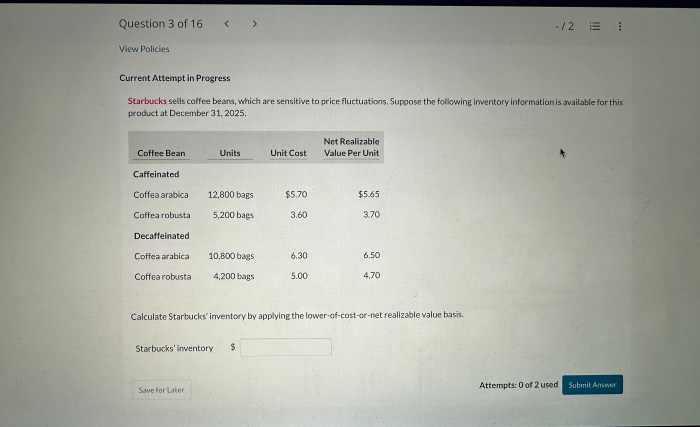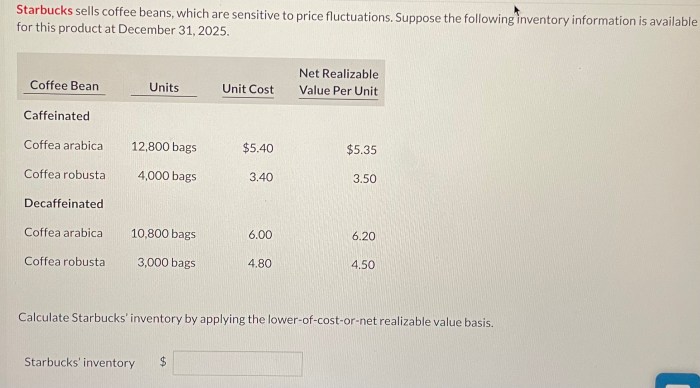Starbucks sells coffee beans which are sensitive to price fluctuations – Starbucks, a global coffeehouse giant, faces the challenge of sourcing coffee beans that meet the demands of its vast customer base while navigating the complexities of a volatile coffee market. This article delves into the intricate relationship between market fluctuations, consumer preferences, and Starbucks’ strategies for ensuring the availability and quality of its coffee beans.
The dynamic global coffee market, influenced by factors such as supply and demand, weather conditions, and geopolitical events, significantly impacts Starbucks’ bean procurement costs. Recent market events, such as the 2021 Brazilian frost and the COVID-19 pandemic, have highlighted the vulnerability of the coffee supply chain and its impact on prices.
Market Volatility and Coffee Bean Pricing
Starbucks’s coffee bean procurement costs are heavily influenced by market volatility in the global coffee industry. Fluctuations in supply and demand can lead to significant price variations, impacting Starbucks’s bottom line. For instance, in 2021, a severe frost in Brazil, the world’s largest coffee producer, caused a sharp rise in coffee bean prices.
Starbucks had to adjust its pricing and sourcing strategies accordingly.To mitigate the risk of price fluctuations, Starbucks employs various strategies. It maintains a diverse supplier base, sourcing beans from multiple regions to reduce dependence on any single market. Additionally, Starbucks engages in long-term contracts with suppliers, securing stable prices over an extended period.
Consumer Demand and Coffee Bean Quality

Consumers have discerning preferences for coffee bean quality, which directly affects Starbucks’s sourcing decisions. Starbucks recognizes the importance of high-quality beans in delivering a premium coffee experience. It collaborates closely with farmers to ensure consistent bean quality, providing technical assistance and training.Starbucks
also conducts rigorous quality control measures throughout its supply chain. It uses sophisticated grading systems to evaluate beans based on size, density, and flavor profile. By maintaining high standards, Starbucks meets the expectations of its customers and maintains its reputation for quality.
Sustainability and Ethical Sourcing
Starbucks is committed to ethical and sustainable coffee bean sourcing practices. It has established the Conservation Through Conversation program, partnering with farmers to implement environmentally friendly farming methods. Starbucks also promotes fair trade practices, ensuring that farmers receive a fair price for their beans.These
initiatives contribute to the long-term availability and quality of coffee beans. By supporting sustainable farming practices, Starbucks helps preserve the environment and the livelihoods of coffee-growing communities.
Competitive Landscape and Market Share

The coffee industry is highly competitive, with numerous players vying for market share. Starbucks maintains a significant market share due to its strong brand recognition, extensive retail network, and innovative product offerings.Key competitors include Dunkin’ Donuts, McDonald’s, and independent coffee shops.
Starbucks differentiates itself through its premium coffee experience, personalized customer service, and loyalty programs.
Future Trends and Innovations

The coffee industry is constantly evolving, presenting both challenges and opportunities for Starbucks. Emerging trends include the growing popularity of specialty coffee, the rise of e-commerce, and the increasing demand for sustainable coffee practices.Starbucks is well-positioned to adapt to these trends through its commitment to innovation.
It has invested in new technologies, such as automated brewing systems and mobile ordering platforms. Starbucks is also exploring alternative coffee sources, such as cold brew and nitro coffee, to meet changing consumer preferences.
FAQ Overview: Starbucks Sells Coffee Beans Which Are Sensitive To Price Fluctuations
How does Starbucks mitigate the risk of price fluctuations in coffee beans?
Starbucks employs various strategies to mitigate risk, including long-term contracts with suppliers, hedging, and diversification of sourcing regions.
How does Starbucks ensure the consistent quality of its coffee beans?
Starbucks has implemented rigorous quality control processes, including bean grading, cupping, and supplier audits, to maintain the high standards of its coffee beans.